Collective Amnesia Makes Us Feel As If There Are No Bi People In History. That Is, Until We See That

Collective amnesia makes us feel as if there are no bi people in history. That is, until we see that bi people have been there all along, they’ve just been mislabeled or left out of the narrative. Bisexuality is the sexual and/or romantic attraction to multiple genders. Nestled within the term bisexual are other labels, including pansexual, omnisexual, and polysexual. Which term people use is almost entirely down to preference, although sometimes the choice is driven by an ahistorical misconception that the bi in bisexual reinforces a gender binary and excludes trans and nonbinary people.
One reason why we might “forget” bisexuals is because those who are attracted to people of multiple genders rarely call themselves bi. Historically, there have been a number of reasons for this, including wanting to avoid discrimination and stigma. There have long been toxic misconceptions of bisexual people as promiscuous and unfaithful, in a confused state of sexual transition or experimentation, lying about their attractions for attention or to attract men (particularly bi women), or simply adhering to some sort of trend (particularly young people).
Being bi could also get you kicked out of your local queer space. Bisexuality introduces nuance, which has always made it easier to discard than accommodate it. In tough times, when queer people were fighting for their lives and for basic legal protections, some gay rights groups strategically rejected bisexual people. For example, in the 1970s there were instances where the Gay Liberation Front, a queer-rights group, treated bisexual people as effectively straight, and thus associated them with regressive politics and edged them out of the organization.
But historians have never let a lack of self-labeling prevent them from trying to find queer people in history. People also shied away from terms like gay or lesbian, and yet we can find many books on their history. Still, it was only when I went back to university for a master’s in queer history that I realized that the absence of bisexuality in most versions of LGBTQ+ history wasn’t because there were no bi people in the past. Rather, that lack of knowledge is the result of an overcompensation for compulsory heterosexuality, which has meant that most people with homosexual desires in the U.S. were forced to live lives that involved heterosexual sex and relationships.
In the search for queer lives in the past, one way that academics have dealt with this is to assume that people who had any kind of same-sex desires or sex must have been gay or lesbian, even if they were also in heterosexual relationships. Partly because of this, the term bisexual is often entirely absent from historians’ writings. By doing so, we are systematically mislabeling people who were attracted to multiple genders, erasing bi history. When we untether bisexual people from their own past, we obscure the ways in which bisexuality is a cornerstone of the human experience.
Here are some important people in bi history you should know:
The bisexuality researchers you need to know
One of the earliest researchers to legitimize the study of bisexual people was Havelock Ellis (1859-1939). Ellis was based in the U.K., and in the 1927 edition of his book Sexual Inversion, he describes many case studies of bisexual people. He includes some negative stereotypes, but also some decidedly positive ones. For example, he wrote that bi women made “great religious and moral leaders.” It is these kinds of positive statements that led to the first edition of his book being ruled “obscene” in an English court because he dared to write about queer lives without condemning them. It took him multiple attempts to get the book published.
Probably the most famous sex researcher of all time was Alfred Kinsey (1894-1956). He was a biologist at Indiana University who introduced nuance into the discussion of sexuality. His Kinsey Scale allows us to categorize sexuality as a number between 0 and 6, from exclusively heterosexual to exclusively homosexual. In his famous mid-20th century studies, he shocked the world when he found that a huge number of people (he often stated “a quarter to half”) had homosexual and heterosexual desires. He also openly criticized other researchers who assumed that people could only be either gay or straight, and spoke of the “endless intergradations” that captured the reality of people’s sexualities.
Following in Kinsey’s footsteps, Fritz Klein (1932-2006) was a sex researcher and psychiatrist who published the book, The Bisexual Option, in 1978. He was a bisexual man himself, and he started a group for bisexual men to help them feel secure in their own sexuality; that practice grew into affirmative therapy that would help many people better understand their own sexual behaviors and identity. The Klein Sexual Orientation Grid is an expanded version of the Kinsey Scale. Klein also set up the Journal of Bisexuality and the American Institute of Bisexuality, which both continue to further bi research today. These organizations have been fundamental in giving a home to research and writing on bisexuality.
Bi activists who fought for queer rights
There have also been a number of tireless activists who have fought for queer and bisexual rights, including Brenda Howard (1946-2005). Howard is sometimes referred to as the “mother of pride” because after the Stonewall uprising, she played a major role in organizing the first marches of LGBT+ people, which laid the foundations for global Pride marches.
Another activist who worked in some of the same groups as Howard, and continues their work today, is Lani Ka’ahumanu (born in 1943). Ka’ahumanu has been a leader of the bisexual rights movement in the U.S. since 1980. She founded a number of groups that were specifically for bisexual people, which was particularly important given the shaky history between bi people and gay and lesbian communities. Ka’ahumanu created safe political spaces where bi people didn’t need to justify their sexuality or their inclusion. To this effect, in 1983, she co-founded BiPOL, one of the first bisexual political action groups in the country; she later co-coordinated the San Francisco Bay Area Bisexual Network. Ka’ahumanu is also a major reason why the B is included in LGBT, because of her campaigning in the leadup to the 1993 March on Washington.
Other people who are still fighting for bi visibility and protections today include activist Robyn Ochs, who wrote the most widely cited definition of bisexuality; New York Times columnist Charles Blow, who fights for bi visibility including in the Black community; and Kyrsten Sinema, who was the first openly bisexual person elected to Congress in 2012.
The main thing that people get wrong about the history of bisexuality is assuming that there is none. As more people embrace bisexual identities, I expect there will be a new thirst for knowledge, followed by a quenching wave of bisexual stories uncovered from the archives of history.
By uncovering previously untold accounts, and re-telling the stories of people previously too eagerly labeled gay and lesbian, bisexual people will finally be able to remember some of the pieces of their own history.
Dr. Julia Shaw is a criminal psychologist at University College London and part of Queer Politics at Princeton University which works for LGBT+ equality, democracy, and civil rights. She is actively involved in bisexual research and is the founder of the international Bisexual Research Group. Shaw’s latest book, Bi: The Hidden Culture, History, and Science of Bisexuality, is set to be released on June 28.
More Posts from Dontkickmyshin and Others
honestly, if Donald had to die for the sake of the plot, the truck was not the way to go. He could've died of internal bleeding from all the hits he took. He could've died of an incidental overdose of his medication because he wasn't put together after the fight. He could've purposefully attempted suicide instead of dying by happenstance. You can tell he wasn't all there when he stood in the middle of the road and refused to move, but still. I don't like it.

The universe pushes them together without their knowledge in completely different projections.
Somewhere they are chasing a serial killer, and both dying from bullets and injustice. Here they listen to the catchy tune while applying enormous amounts of eyeliner.
This is so ironic, Matt thinks, looking at Mello.
Mello always carries a rosary on his pistol with him. Of course, the God that Mello honors so much wouldn't like it... Matt is always smoking a nervous cigarette with the calmest and most imperturbable face.
Their attributes seem to be the red thread between them. It doesn't break.
They will always find each other.
inspired by NA NA NA - MCR
another version, less saturated

Mad that in 2021 we expect people to text us back immediately, when back in 1845 you’d just send your husband off on a ship to discover the Northwest Passage, not hear from him for 3 years, then fund an expedition to find his half-cannibalised body.


foodjars_
I LITERALLY THOUGHT OF THAT SONG WHILE WRITING THIS ANALYSIS!!! I wanted to put it in because I thought, "wow this is na baekjin fr" but i got a little sick of writing😓😓😓
do you guys get it if i say donald na is taylor swift coded

one thing i really like about weak hero's character design is that they let giju have stereotypically feminine traits like manicured nails and makeup and never ridicule him for it. whenever i see those traits on a man in another webtoon (if i even see it at all) they're usually the perverted gay man stereotype
Thanks to whoever edited this wiki article of Kaz Brekker
it’s hilarious



One thing that like. shakes me to the core if I think about the radiant emperor duology. is how Zhu wanted to help Ouyang despite the betrayal, in a way that was more than just a convergence of their fates.
Two things: since the first book, we know they're similar, connected, and that Zhu feels this connection wholly with a fascination that slowly becomes more complicated. She is more open to the connection that Ouyang, because she embraces wholly who she is, knowing her otherness in a complete way that for Ouyang was only pain and self-hatred. Second, Zhu is incredibly strong, mentally and emotionally, in separing herself from those who aren't in her tightest circle. Shelley wrote in two beautiful separate instances in hwdtw how when you witness someone in pain, if you don't hate that person you will be contaminated by that pain, and Zhu has for most of the series such unflinching emotional fortitude that while she observes and acknowledges and fights for other's pain, she doesn't feel it herself, not completely. Book one ends with her killing a kid because he is in her way, we can't forget it.
Ouyang's grief, so potent throughout the entire second book, is fully understood by Zhu only when she loses Xu Da. And Xu Da's death, united with the connection Zhu and Ouyang have nurtured in their fucked up way of theirs, is enough that when Ouyang's deep-rooted disgust and refusal of femininity breaks their alliance, it doesn't break their connection. Sure, Zhu feels true betrayal, and mours the possibility of a future that Ouyang sees only for a brief moment, for himself after the end of his revenge, made possible by Zhu. But Zhu, who is so ruthless she is similar to a person who is more violence than humanity, kind of... pushes the betrayal aside. She will help him anyway. They have the same goal. She keeps on including him in her dream of a future, even after he betrayed her.
When she learns of Ouyang's death, she tries to be happy he at least got what he wanted, completed his fate. She wants his desire for revenge to have mattered for herself, to quench the doubt if everything she's doing is worth the pain, and for Ouyang, sadness in her heart. But she already knows somethins is wrong in the air, in the room where the Great Khan's blood ran down the tiles, and that's what makes me insane. Their bond didn't break when Ouyang rejected their sameness and betrayed her. The bond deteriorates only when his sacrifice was for nothing. Zhu aches for Ouyang. She carries his ghost with her and at the last moment, Ouyang would be her final weapon. Except we've seen how Xu Da's death changed things. How grief, for Xu Da and Esen, shaped Zhu and Ouyang forever. So the fact that the last thing Zhu does before starting her reign is fixing the bond, restoring it to its original resonance, is what proves she was going to forgive him, in a way. She was going to give him a place in the new world.
The entire book is a sequence of tragedies, created by love expressed too late, too little, love that was not enough, yet was also the cause of every tragic end. So there's a little love also in Ouyang and Zhu's tragedy, where their sameness wasn't enough, and Ouyang is the last piece of the old world, made better by Zhu's will for a better future.

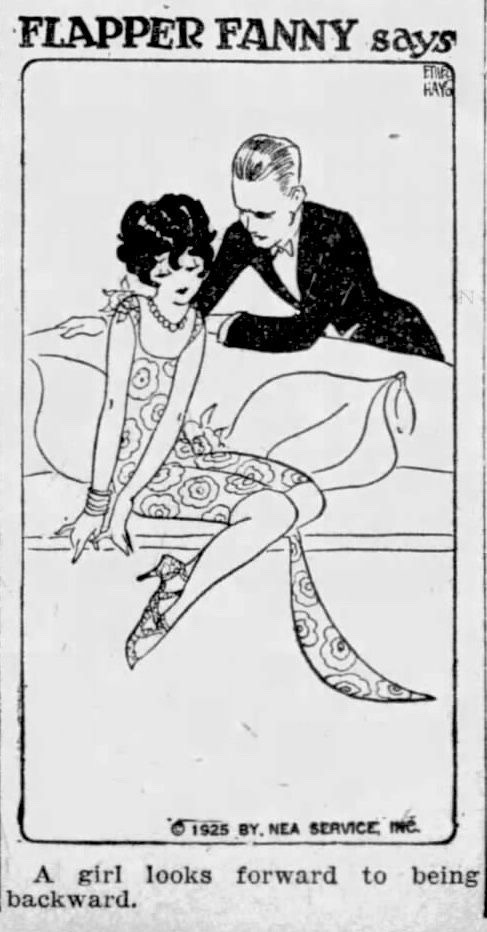
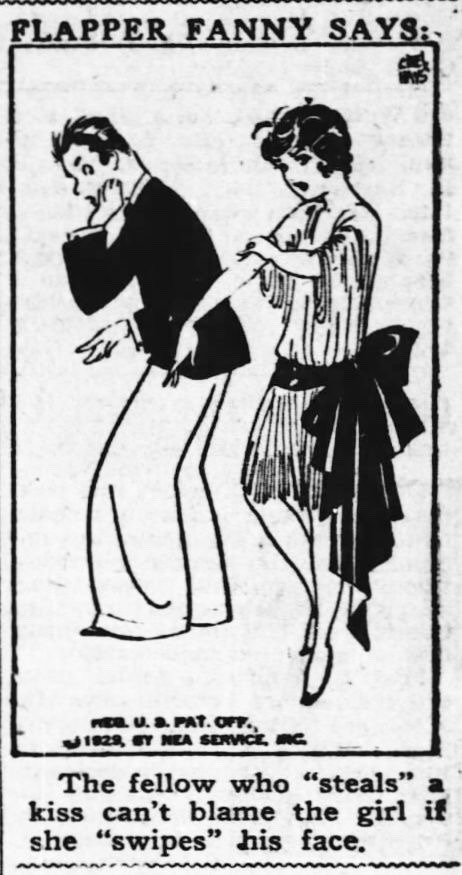

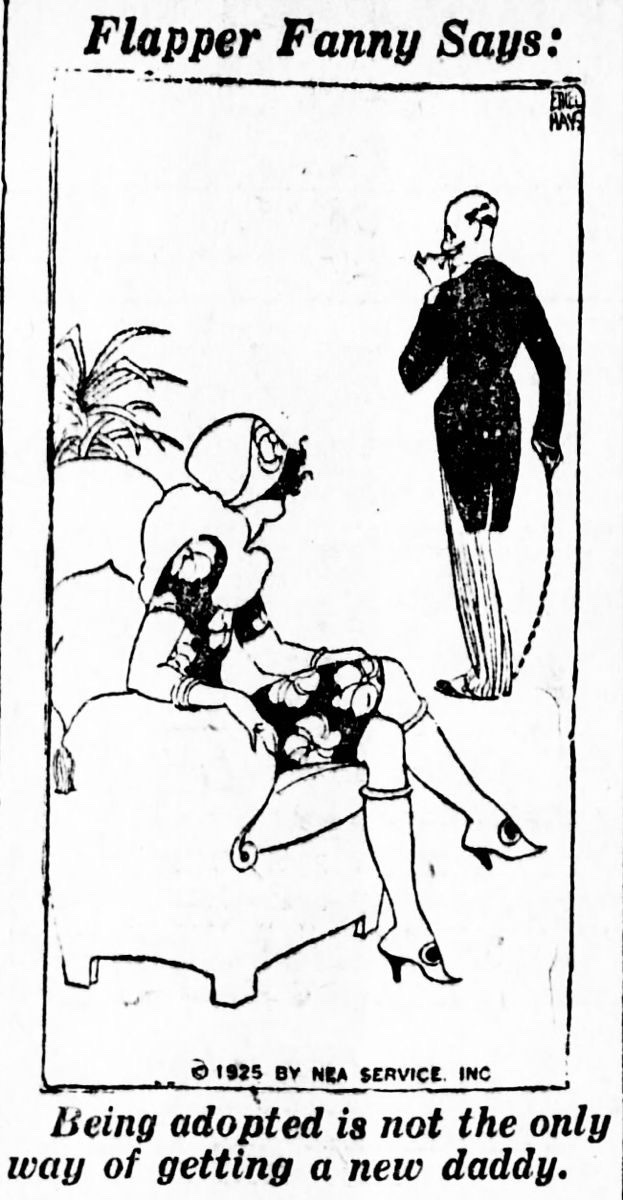
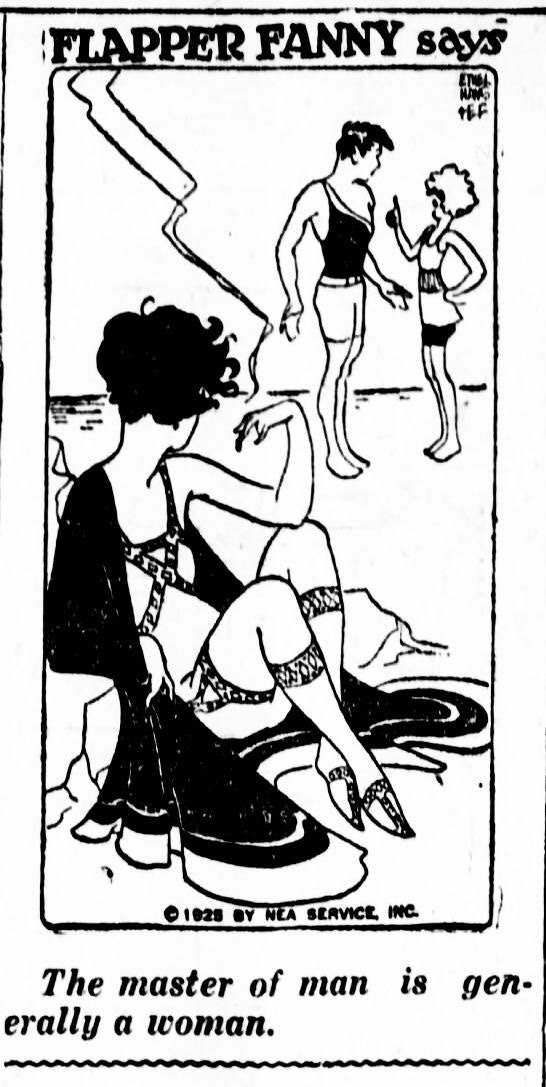
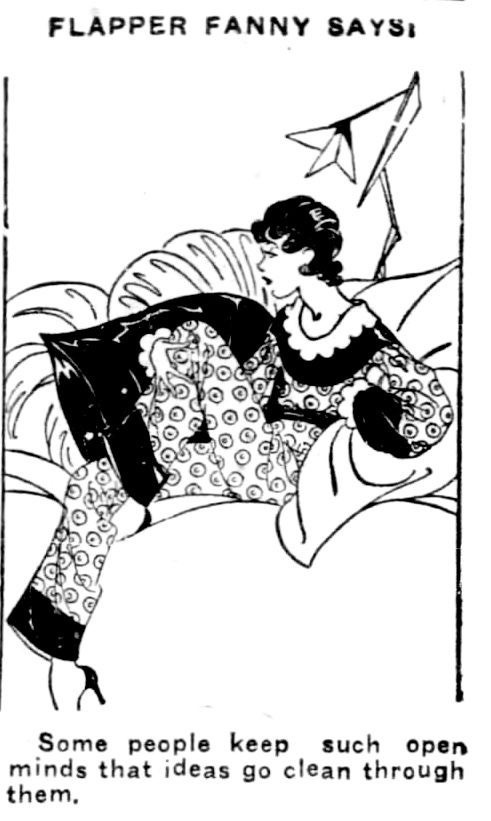
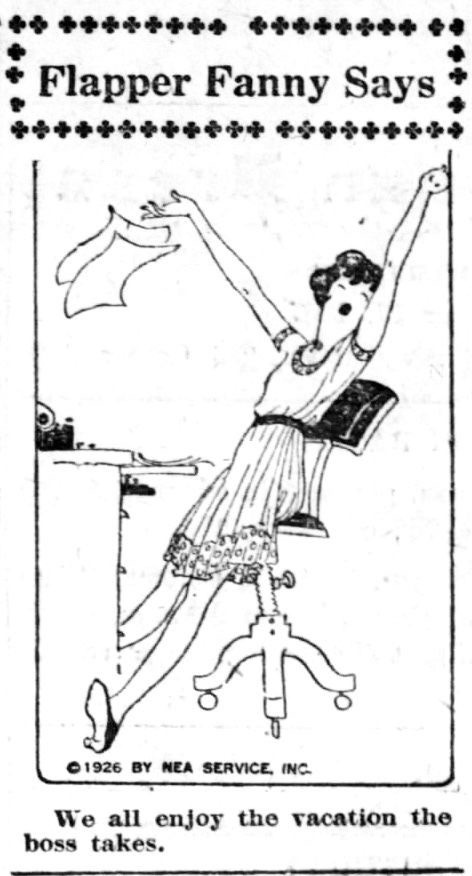

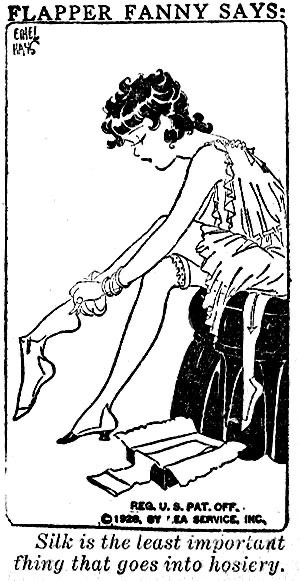
FLAPPER FANNY SAYS, by American cartoonist, Ethel Hays (1892-1989).
Random MelloMatt HCs
-Mello and Near call each other when they're stuck on the daily crossword. The phone calls consist of:
N: Eight letter word for stubborn. Fourth letter is U.
M: Obdurate.
N: That's the one. Ciao.
----- next day -----
M: Can you please, for the love of fuck give me a hint as to what the pissing answer for 22 across could be?? I haven't got a fucking clue. Matt insists its Impermeable but I KNOW he's wrong.
N: Matt is correct.
M: Motherfucker! Peice of shit fucking paper! Bye Near, I hope you have a terrible day. Matt says hi.
-Matt is a spontaneous gifter. Not only is he great at buying random gifts for Mello when he leaves the house, but he's also great at making them. Like out of nowhere he'll whip out a mini origami crane and give it to Mello and say something lame yet endearing like
"Hey, hi I made you something. Hope you like it. 🙂" And everytime Matt does it, Mello's heart does 10 million summersaults and he feels so loved he could cry.
But Matt also uses his gifts for 'evil' if he feels like being a little shit. He'll walk up to Mello and be all sweet like: "Hey Mels, I have a gift for you. 😇" And Mello is presented with a surprisingly detailed sketch of a butt. When he asks who's butt it is, Matt tells him it's Near's (it's not, but that doesn't stop Mello from physically recoilling at the mental image that brings up) and Mello doesn't speak to him for the rest of the day. This is Matt's favorite way of pranking Mello bc there's a 50/50 chance Mello will either laugh about it or become instantly furious with him. Either outcome is hilarious to Matt because Mello's reactions are priceless. One morning, Matt drew a mini comic of Roger as the Ice King from Adventure Time and Mello laughed so hard orange juice came out of his nose.
Mello ofc saves and cherishes all of Matt's little gifts. He has a sizable jewelry box that's filled with random origami, love notes, doodles/sketches, mini dream catchers, friendship bracelets, and a litany of other crafty gifts. Some are from when they were kids but most of them are recent. The few from the Kira case are the ones Mello appreciates the most. It reminds him of how even during the darkest moments of his life, he had Matt by his side; loving him and giving him dumb, cute little gifts.
Mello isn't very good at making stuff, but he does give Matt an occasional note or scribbly doodle. Sometimes they spend the whole day passing notes and sketches to each other. Most of the time they try to make each other laugh, but they'll occasionally slip in something romantic or sweet. Or spicy, to keep things interesting 👀
-Mello sends Matt selfies whenever he leaves the house. It's always random; most of the time they're thirst traps but sometimes he'll send a close up of him making a goofy face or rolling his eyes. When he goes clothes shopping he sends Matt pics of all the outfits he likes. Matt always responds with some kind of emoji, meme, or selfie of his own.
Matt adores all of the selfies and has a whole folder on his phone and computer dedicated to them. When he's sad or missing Mello, he'll scroll through them and it always cheers him up. He also sets them as the backgrounds on his phone and changes them like every other day bc he can never decide which one is his favorite (they're all his favorites ofc). Matt usually sets the goofy/unflattering selfies of Mello as his background bc it's rare to have a picture of him being silly, but Mello throws a fit whenever he notices it 😂
...
Enjoy some random hcs!
As some of you may know, these past few weeks were pretty rough on me and my family. Everything's alright now, but things were scary for a while. Now that everything has settled down, I'm feeling more like myself again so I've been trying to get back into writing. I'm starting out small with some dumb fluffy head canons, so I may make a few tiny posts here and there. Also I'm starting to write out the next fic request! I promise I haven't forgotten 😅 many apologies for the wait, but life got in the way.
Love you all, take care!!!
-
 spots-of-gold liked this · 2 years ago
spots-of-gold liked this · 2 years ago -
 bemamar reblogged this · 2 years ago
bemamar reblogged this · 2 years ago -
 mad-fantastic-world liked this · 2 years ago
mad-fantastic-world liked this · 2 years ago -
 sporadicmoonbeard liked this · 2 years ago
sporadicmoonbeard liked this · 2 years ago -
 arabasworld liked this · 2 years ago
arabasworld liked this · 2 years ago -
 knownunknown345 liked this · 2 years ago
knownunknown345 liked this · 2 years ago -
 dmnbby liked this · 2 years ago
dmnbby liked this · 2 years ago -
 boneless-watermellon liked this · 2 years ago
boneless-watermellon liked this · 2 years ago -
 mermaidvampire liked this · 2 years ago
mermaidvampire liked this · 2 years ago -
 davido1964 liked this · 2 years ago
davido1964 liked this · 2 years ago -
 dandarajacksonn liked this · 2 years ago
dandarajacksonn liked this · 2 years ago -
 dontkickmyshin reblogged this · 2 years ago
dontkickmyshin reblogged this · 2 years ago -
 dontkickmyshin liked this · 2 years ago
dontkickmyshin liked this · 2 years ago -
 gummiefrog liked this · 2 years ago
gummiefrog liked this · 2 years ago -
 jenanca liked this · 2 years ago
jenanca liked this · 2 years ago -
 kisari-is-an-idiot reblogged this · 2 years ago
kisari-is-an-idiot reblogged this · 2 years ago -
 kisari-vibes reblogged this · 2 years ago
kisari-vibes reblogged this · 2 years ago -
 kisari-vibes liked this · 2 years ago
kisari-vibes liked this · 2 years ago -
 izztremes-blog reblogged this · 2 years ago
izztremes-blog reblogged this · 2 years ago -
 inappropriate-aunt liked this · 2 years ago
inappropriate-aunt liked this · 2 years ago -
 stairsthe33rd liked this · 2 years ago
stairsthe33rd liked this · 2 years ago -
 theflyingpotatoninja reblogged this · 2 years ago
theflyingpotatoninja reblogged this · 2 years ago -
 theflyingpotatoninja liked this · 2 years ago
theflyingpotatoninja liked this · 2 years ago -
 iby-dysphoria-queen liked this · 2 years ago
iby-dysphoria-queen liked this · 2 years ago -
 greatgreatauntie liked this · 2 years ago
greatgreatauntie liked this · 2 years ago -
 smart-bitch-hours liked this · 2 years ago
smart-bitch-hours liked this · 2 years ago -
 bemamar liked this · 2 years ago
bemamar liked this · 2 years ago -
 bisaster-human liked this · 2 years ago
bisaster-human liked this · 2 years ago -
 angelcyberspace liked this · 2 years ago
angelcyberspace liked this · 2 years ago -
 metro-mtp liked this · 2 years ago
metro-mtp liked this · 2 years ago -
 luthebucketman liked this · 2 years ago
luthebucketman liked this · 2 years ago -
 sleepy-baby-snake liked this · 2 years ago
sleepy-baby-snake liked this · 2 years ago -
 ishachan liked this · 2 years ago
ishachan liked this · 2 years ago -
 conferringwithcats reblogged this · 2 years ago
conferringwithcats reblogged this · 2 years ago -
 violetheart77 liked this · 2 years ago
violetheart77 liked this · 2 years ago -
 queenieque liked this · 2 years ago
queenieque liked this · 2 years ago -
 wepolian reblogged this · 2 years ago
wepolian reblogged this · 2 years ago -
 wepolian liked this · 2 years ago
wepolian liked this · 2 years ago -
 jamiesgirl liked this · 2 years ago
jamiesgirl liked this · 2 years ago -
 kylexknife reblogged this · 2 years ago
kylexknife reblogged this · 2 years ago -
 noidedgirl liked this · 2 years ago
noidedgirl liked this · 2 years ago -
 panic-at-the-fairytale-disco liked this · 2 years ago
panic-at-the-fairytale-disco liked this · 2 years ago -
 hellomynameisbisexual reblogged this · 2 years ago
hellomynameisbisexual reblogged this · 2 years ago
